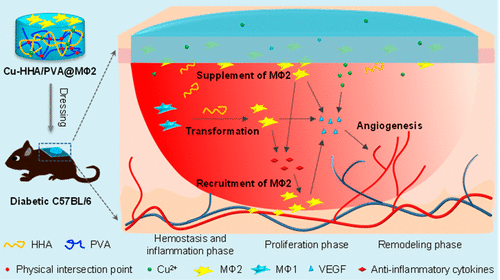当前位置:
X-MOL 学术
›
Biomacromolecules
›
论文详情
Our official English website, www.x-mol.net, welcomes your
feedback! (Note: you will need to create a separate account there.)
Dual Cross-linked HHA Hydrogel Supplies and Regulates MΦ2 for Synergistic Improvement of Immunocompromise and Impaired Angiogenesis to Enhance Diabetic Chronic Wound Healing.
Biomacromolecules ( IF 5.5 ) Pub Date : 2020-08-07 , DOI: 10.1021/acs.biomac.0c00891 Sha Liu 1, 2, 3 , Jie Yu 1, 2 , Qingfei Zhang 1, 2 , Hongtong Lu 1, 2 , Xuepeng Qiu 2, 3 , Dongfang Zhou 1, 4 , Yanxin Qi 1 , Yubin Huang 1, 2
Biomacromolecules ( IF 5.5 ) Pub Date : 2020-08-07 , DOI: 10.1021/acs.biomac.0c00891 Sha Liu 1, 2, 3 , Jie Yu 1, 2 , Qingfei Zhang 1, 2 , Hongtong Lu 1, 2 , Xuepeng Qiu 2, 3 , Dongfang Zhou 1, 4 , Yanxin Qi 1 , Yubin Huang 1, 2
Affiliation

|
Immunocompromise and impaired angiogenesis of diabetes lead to chronic inflammation when wounds occur, which is the primary reason for the long-term incurable nature of diabetic chronic wounds. Herein, a high-molecular-weight hyaluronic acid (HHA) hydrogel is developed to supply and regulate M2 phenotype macrophages (MΦ2) for synergistic improvement of immunocompromise and impaired angiogenesis. MΦ2 are seeded on the Cu-HHA/PVA hydrogels prepared by Cu2+ cross-linking of low degree and physical cross-linking (one freeze–thaw cycle and unique lyophilization) to form Cu-HHA/PVA@MΦ2 hydrogels. The Cu-HHA/PVA@MΦ2 hydrogel can directly supply the MΦ2 in the wound site, maintain the consistent phenotype of loaded MΦ2, and transform the M1 phenotype macrophages (MΦ1) in the wound bed to MΦ2 by HHA. Furthermore, Cu2+ could be released from the hydrogels to further stimulate angiogenesis, thus accelerating the wound-healing phase transition from inflammation to proliferation and remodeling. The average wound area after the 0.5Cu-HHA/PVA@MΦ2 (ionic cross-linking degree 0.5%) treatment was much smaller than that of other diabetic groups at day 12 and close to that of the wild nondiabetic control group. Therefore, this facile hydrogel strategy with multiple modulation mechanisms of immunocompromise and angiogenesis may act as a safe and effective treatment strategy for a diabetic chronic wound.
中文翻译:

双重交联的HHA水凝胶提供并调节MΦ2,以协同改善免疫功能低下和血管生成受损,从而增强糖尿病性慢性伤口愈合。
发生伤口时,糖尿病的免疫功能低下和血管生成受损会导致慢性炎症,这是糖尿病慢性伤口长期无法治愈的主要原因。本文中,开发了高分子量透明质酸(HHA)水凝胶以提供和调节M2表型巨噬细胞(MΦ2),以协同改善免疫功能低下和血管生成受损。MΦ2接种在通过低度Cu 2+交联和物理交联(一个冻融循环和独特的冻干作用)制备的Cu-HHA / PVA水凝胶上,形成Cu-HHA / PVA @MΦ2水凝胶。Cu-HHA / PVA @MΦ2水凝胶可以直接在伤口部位供应MΦ2,保持负载的MΦ2的表型一致,并通过HHA将伤口床中的M1表型巨噬细胞(MΦ1)转化为MΦ2。此外,铜可以从水凝胶中释放2+来进一步刺激血管生成,从而加速伤口愈合从炎症到增殖和重塑的相变。0.5Cu-HHA/PVA@MΦ2(离子交联度0.5%)处理后的平均伤口面积在第12天远小于其他糖尿病组,并且接近野生型非糖尿病对照组。因此,这种具有免疫调节和血管生成的多种调节机制的简便水凝胶策略可作为糖尿病慢性伤口的安全有效治疗策略。
更新日期:2020-08-07
中文翻译:

双重交联的HHA水凝胶提供并调节MΦ2,以协同改善免疫功能低下和血管生成受损,从而增强糖尿病性慢性伤口愈合。
发生伤口时,糖尿病的免疫功能低下和血管生成受损会导致慢性炎症,这是糖尿病慢性伤口长期无法治愈的主要原因。本文中,开发了高分子量透明质酸(HHA)水凝胶以提供和调节M2表型巨噬细胞(MΦ2),以协同改善免疫功能低下和血管生成受损。MΦ2接种在通过低度Cu 2+交联和物理交联(一个冻融循环和独特的冻干作用)制备的Cu-HHA / PVA水凝胶上,形成Cu-HHA / PVA @MΦ2水凝胶。Cu-HHA / PVA @MΦ2水凝胶可以直接在伤口部位供应MΦ2,保持负载的MΦ2的表型一致,并通过HHA将伤口床中的M1表型巨噬细胞(MΦ1)转化为MΦ2。此外,铜可以从水凝胶中释放2+来进一步刺激血管生成,从而加速伤口愈合从炎症到增殖和重塑的相变。0.5Cu-HHA/PVA@MΦ2(离子交联度0.5%)处理后的平均伤口面积在第12天远小于其他糖尿病组,并且接近野生型非糖尿病对照组。因此,这种具有免疫调节和血管生成的多种调节机制的简便水凝胶策略可作为糖尿病慢性伤口的安全有效治疗策略。











































 京公网安备 11010802027423号
京公网安备 11010802027423号